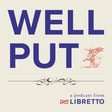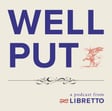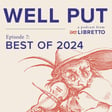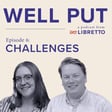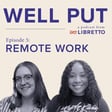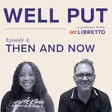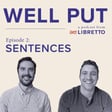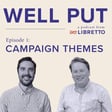Become a Creator today!Start creating today - Share your story with the world!
Start for free
00:00:00
00:00:01

Episode 3: How to Lead a Great Interview
Every Libretto project starts with in-depth qualitative discovery, allowing us to surface the key differentiators that will be essential in our work.
Join Ian and Neal as they discuss how authentic curiosity is critical to a great discovery interview.
Hosted by Ian Sutherland and Neal Kane
Produced by Tiffany Carlson
Edited by Connor Ferguson
Music by Coma-Media, via Pixabay
© 2024 Libretto. All rights reserved.
Recommended
Transcript
Introduction to 'Well Put' Podcast
00:00:12
Speaker
Welcome to Well Put, the podcast about communications for mission-driven organizations from Libretto. My name is Ian Sutherland and I'm a creative lead here at Libretto. And I am Neil Cain and I am the founder and president of Libretto.
Approach to Discovery and Interviewing
00:00:28
Speaker
And today, ian and I will be talking about our approach to discovery and techniques that we use as a firm to build a sense of trust and connection with clients during the what yeah what we characterize as a qualitative interviewing process and how that helps drive our ah subsequent work.
00:00:52
Speaker
I've had the pleasure of conducting a lot of discovery interviews with you, Neil, and I've certainly learned a lot from your approach. I think a good place for us to start today is the preparation for those conversations.
00:01:05
Speaker
What do you do to prepare for a discovery interview?
Preparing for Discovery Interviews
00:01:08
Speaker
There's a short list of things that you want to address and you do want to go in with a sense of preparation and you don't want to just sort of have confidence in your ability to wing it.
00:01:22
Speaker
um i mean, you want you want the conversation to be organic and to go in interesting places, but you also again want to begin the conversation and with a sense of who the organization is,
00:01:36
Speaker
hopefully a sense of the person that you're interviewing in terms of LinkedIn profiles are a really great way of getting background information about folks. We tend to do one of the many, what I would characterize as the slightly Zen Buddhist things that we do is that we prepare a list of questions, which we sometimes call a discussion guide.
00:01:56
Speaker
ah We ah typically don't share that with the interview subject, but we always have a first question queued up.
Discussion Guide and Organic Exploration
00:02:02
Speaker
And then ah we, to a certain extent, let the conversation go where it will. And the paradox that we often find is that at the end of that conversation, when you refer to the list again, all the questions have been asked, but not necessarily in in a serial order.
00:02:20
Speaker
It happens more in the context of a kind of hyperlinked discussion. Indeed, i found that very interesting when I started working at Libretto, the nonlinear approach oftentimes yields tangents ah to areas that you may not have thought you were going to go into during that conversation, but that yields a lot of great candor.
Group Interview Techniques
00:02:42
Speaker
And a lot of um insights that maybe you wouldn't have even have thought you would have gotten at the onset of the conversation. I'm curious too, Neil, when you approach a discovery interview with multiple people versus one-on-one, how do you ah run a session like that?
00:03:00
Speaker
So one of the things I find that when you're doing in particular, a group interview, because I am a Virgo, I tend to think of things somewhat analytically in that regard, where let's say you have, if you have five people that you're interviewing and you have a 60 minute session and that sort of, it begins to approximate the the maximum you want to do in a, in a, like something like a group zoom interview, that's 12 minutes a person.
00:03:26
Speaker
And, you know, it's maybe stating the obvious, but, You know, once you go above your 12 minute quotient, someone else's is being taken away from.
00:03:37
Speaker
So I try to be ah not too rigid about it, but to maintain awareness around who's talking and how much and how good the representation is.
00:03:49
Speaker
And i I also encourage you know people to give more quick inputs that are briefer so that you just get more points.
00:04:01
Speaker
And I think when you set that expectation up front, you're less likely to get things that feel more like, you know quote unquote speeches, which is, again, something I'm less um eager to be hearing in that kind of a session.
00:04:16
Speaker
I'm particularly fascinated by group discovery conversations because I think there's a real element of vulnerability when you're on the other side of the questions and you're in that group providing answers.
00:04:27
Speaker
I think of a medical center where we had conducted work a few years ago and we were talking to a team of nurses. and i just remember thinking oh that could be difficult ah in front of your colleagues and particularly in front of your superiors to share something that's candid uh to in this case the two of us who to them were of course strangers one thing i've noticed you do in those settings that i've started to started to do myself is provide a little bit of personal context as well i'm thinking of how you always say you know I'm one of eight children where there are no no favorites, that you're the son of a legal worker and a excuse me a legal legal aid and a social worker.
00:05:06
Speaker
And I have noticed that allows people to then be a little more vulnerable themselves. Is that a tactic you do in every situation, Neil, or is that something you decide upon given the context of the group?
00:05:18
Speaker
I really try to gauge it in the moment. One of the things that I always say is that emotional intelligence is a huge component and a huge dimension of our work.
00:05:29
Speaker
And I think what that means is Again, it's about a balance between being authentically yourself and remembering that you know the interview is not about you. right so And I was thinking of with that with the healthcare folks, I remember we were interviewing folks from a visiting nurse and hospice organization.
00:05:53
Speaker
And I'm virtually certain that in that situation, I probably talked for a couple of minutes about the fact that both of my parents were in hospice and it was a really ah amazing, difficult, revelatory situation that also made me just incredibly appreciative of the work that those folks do.
00:06:18
Speaker
i mean, again, I think in a situation like that where you're expressing sincere appreciation, For people who may often feel underappreciated, I just think that really contributes to the depth and authenticity of what you get out of people because you're putting, you know, it's almost like you're putting a little bit of yourself on the line.
Building Rapport with Personal Anecdotes
00:06:38
Speaker
And again, always in the service of drawing them out. rather than, oh I have a great anecdote that I want to tell, you know, because that's it's it's not about that. It's really about it. Really, it's really about it's talking about yourself in a way that's going to elucidate
00:06:57
Speaker
an interesting response from them. Exactly. Almost it's in service to the conversation that they will then provide their own insights from. So one thing I'm interested in hearing your perspective on, Ian, is because there's often two of us, typically there's two of us in interview situations, which is something I always advocate for because you can kind kind of divide the note taking and the asking um portions of things.
00:07:25
Speaker
And I also I know that I've said more than once, Again, one of my quasi cryptic Zen Buddhist observations is what is it? um I'm fine with being talked over and I hate being interrupted.
00:07:39
Speaker
So I'm wondering, it's like when you're in a situation where someone, me or someone else is kind of, driving and you're trying to figure out a way to ask a question that you think is really essential, like what is what is the best technique for making that happen so it doesn't feel like the interviewing is being totally dominated by one person.
00:08:00
Speaker
think it's two elements. One, you have to follow the flow of your co-interviewer, whoever is leading that particular session. And you also have to follow the flow of the answers that have come up so far so that it's whenever you jump in to ask a question of your own, it's not overly tangential. It's not off topic. It's following the structure that's sort of already been laid down ah by both the interviewer and the interviewees.
00:08:30
Speaker
I don't know if it's a good metaphor, but I sort of think of someone who's doing the navigation ah during a road trip. There's a driver. The driver probably has a pretty clear idea of where they are going.
00:08:43
Speaker
But every now and again, they'll rely on the person in the passenger seat next to them. at the opportune moment, not right before the turn or right after the turn to provide a little bit of navigational guidance.
00:08:55
Speaker
So when I'm in those situations, whether it's with you or another librettist, I really just try to be that light touch of navigational guidance to keep the conversation moving forwards, not asking a question that's going to take us in a completely different direction.
00:09:12
Speaker
It's fine if there are tangents, of course, but when you add that other voice in the interviewing capacity, you really want it to be a gentle
Diverse Perspectives from Organizational Interviews
00:09:22
Speaker
ah movement so that the conversation stays on track as much as possible.
00:09:28
Speaker
it it's so That is so crazy because I was just thinking about how when Chip and I went to Ireland and we were going to rent a car because you want to see the countryside.
00:09:40
Speaker
And several people said to us, only one person can drive. You have to decide who's going to drive because you're driving on the left side of the road. And, ah you know, we'd flown all night and I just made the decision. I've never done this. I want to do it.
00:09:54
Speaker
And it was largely a blast. And it's funny, a couple of days ago, I was at a party and I was demonstrating for someone and what you do when you're driving a standard on the wrong side of the road and you're entering a rotary, which they call a roundabout.
00:10:10
Speaker
And there's a total like muscle memory-like pose where you're looking over your shoulder and and also you're shifting with your left hand. because you're Anyway, speaking of tangents, I think that's a great analogy. um Something else I wanted to ask you about was, as you know, when we start an engagement, at some point, the client at the kickoff stage will andevably almost inevitably say, well, who you know who do you think you should talk to?
00:10:36
Speaker
And can you talk a little bit about how we come up with, we sort of parse or strategize that list of participants? Yeah, I think one thing that makes libretto distinct in our field is that we talk to ah very non-hierarchical list of people, whether that's at a nonprofit organization, whether that's a higher education institute, ah whether it's a preparatory school.
00:11:02
Speaker
We're not just speaking to executive leadership. We're not just talking to administrative folks. We really go from top to bottom and back again. ah so The reasoning behind that is because it allows us to get the widest ah possible um variety of insights.
00:11:21
Speaker
Some of the best perspectives have come from folks that ah it may not have been thought those insights would come from. um And a great example of that I'm thinking of currently, when we were doing a discovery session for a medical system that we work with in New England, we had one of our most favorite quotes come from an ambulance driver ah that we had interviewed as part of our discovery conversations.
00:11:46
Speaker
So it wasn't a rock star neurosurgeon. It wasn't a member of the executive team, though we had great conversations with those folks as well. But this hospital driver, when we asked them,
00:11:58
Speaker
how they would describe their role, they used the phrase, I help the hands that heal. And that ended up being a ah concept we returned to many times throughout our presentations um and development of the the platform, the messaging platform that we created. Yeah, what I love about that is uh, one thing is that it totally has ah a solo, what I call a solar plexus moment.
00:12:22
Speaker
Like it's really, it really resonates emotionally and it kind of comes out of nowhere. you know, again, we might've been interviewing, you know, senior faculty members at MIT one day. And the next day we're talking to continuing ed students who had gone back to a, uh, sort of a part-time adult learner program. Uh, and it was someone who had had a,
00:12:44
Speaker
an associate's and she got a bachelor's degree in marketing. And, you know, when you think about, one of the things that i truly believe is that you have to bring that same sense of curiosity and empathy And really care to both interviews, because otherwise, if you situate people within that kind of a hierarchical perspective, I mean, people talk all the time about equity and that is not equitable.
00:13:11
Speaker
You know, if you if you are less curious about someone else's sort of life experience, you know, it's it's really about like having an authentic conversation with whoever the other person is that you're, you know, across from.
00:13:26
Speaker
And the outcome of that, I think, is seen when we present, whether that's our findings or in a platform that will develop or a piece of campaign communications that we're working on. The feedback we always hear is, well, you guys really went deep.
00:13:40
Speaker
You guys did the work. You spoke to everybody. um And I think that's another mantra of yours, Neil, is that we...
Curiosity-Driven Questions
00:13:48
Speaker
we We want to talk to everybody we need to talk to and don't... Well, I'll throw that one to you, I suppose, but to walk through it. No, it it it is. It's again, ah you know, hashtag quasi Zen Buddhist.
00:14:00
Speaker
But it is that idea of talking to everyone you need to talk to and not talking to anyone you don't need to talk to. And what that means is a good cross section of the stakeholders who are really going to drive the project that you're doing, a messaging platform, or a case statement.
00:14:14
Speaker
a viewbook without getting into a lot of redundancy and granularity that makes the conversations feel like a little bit predictable. And I think, I mean, I think that's part of it for me is like, I always want to go in with without a predetermined sense of what we're going to get out of it. And I was just mentioning that resumed-ed example, you know, that person it's like, so how long was the gap between like your associates and your bachelors?
00:14:41
Speaker
What prompted the gap? What inspired you to go back? What was the hardest thing and about finishing? What was the biggest surprise that you found when you had the bachelors versus the assess? I mean, again, right there, there's half a dozen questions. yeah that you know And we'll get another kind of truism is this whole idea of you know not asking a question to which you already know the answer.
00:15:07
Speaker
And actually, that's another thing I wanted to ask you about was because And we've talked about this. We had this one moment where we were in internal meeting. And i again, one of my a sort of mantra is like, I never ask a question to which I already know the answer.
00:15:19
Speaker
And another librettist said, well, that's great, Neil. But what if we don't know the answer and you do? And I would ask you, ian like, what do you do in that situation?
00:15:30
Speaker
It's funny because I almost have a i a third a perspective on that. I think sometimes it is okay to ask a question you already know the answer to because it may be helpful for that person to put that answer in their own words. And there may be something in that answer that you already know that you didn't think about in that particular way or a way in which that perspective was shared that's helpful for the project overall.
00:15:57
Speaker
So i think I think you can go one one of Many ways with that. But I do I do find it can be helpful to whether as a opening question, something a little more softball just to get the conversation going.
00:16:10
Speaker
Ask something that you're probably already have an awareness of what that answer will be just to give that person the opportunity to frame it in their own way.
Memorable Interview with MacArthur Fellow
00:16:21
Speaker
That being said, after that conversation you with that other librettist, who I will say for the record was not made, how has that changed?
00:16:29
Speaker
How has that changed your approach to that issue? Do you now ask questions you know the answer to? Not necessarily, but I virtually always try to leave space for my colleague and leave minutes where my colleagues can ask a question that they wanted to pose and they that they haven't heard yet.
00:16:53
Speaker
And I'll i'll go on one other little tangent, which is one of our clients who we worked with at multiple organizations, and he was at a university, and he said, you know what's different about about the students this place? And I said right off the bat, please don't tell me that it's different because people hold the door open for you.
00:17:14
Speaker
Because we've heard that on so many campuses. And he goes, oh, well, that's exactly what I was going to say, but never mind. And then the next time we went to see him, we drove into the parking lot that was reserved and it said, Neil Cain Libretto. And underneath it said, under no circumstances should you hold the door open for this person if you see him.
00:17:37
Speaker
I do remember that. One of my all time, just absolutely my all time favorite. you know It's a fantastic story, which of course makes me pose the question of all of the discovery conversations that you have conducted.
00:17:53
Speaker
Do you have a particular favorite moment? And maybe that's a recent interview you conducted. Maybe it's one from earlier in your career. What comes to mind? ah One that I do talk about was with a, ah again, it was with a MacArthur Fellow.
00:18:09
Speaker
And ah this person was a world-class expert on exoplanets. ah Again, just an absolutely gripping conversation. And and towards the end, ah again, because Neil, I said, you know i just i have to ask you, can you tell me what the you know how the the MacArthur prize sort of changed, what effect it had on your life and essentially what did use the money for? it And she said, oh, I spent a lot of it on childcare.
00:18:39
Speaker
And I'm sure I said, okay, that's the most interesting thing I've heard all month. And would you tell me a little more about it? And it turned out that just before she won, it became, was named a fellow, she was widowed.
00:18:54
Speaker
And so she had a young child and she was trying to carry on this work and and grieve and raise a kid which is again just an just unfathomable set of circumstances and she said she said well when i had the the money i would go to a conference like in europe and then i'd be like oh you know well let's i'll bring the nanny along And then she goes, and let's bring the nanny sister.
00:19:22
Speaker
so it was this totally, I mean, some would say almost kind of mundane thing, but hugely, hugely human. And something that talk about, you don't see it coming.
00:19:34
Speaker
And it's, it's incredible. It's also, it's incredibly moving. And it's part you you know, you're doing your job and you're, you're there to do that job. But one you know one of the things I used to say when I when i worked more in the corporate arena was, you know scratch the suit, find a person.
00:19:52
Speaker
So i think I think a big part of it is, ah don't i don't as I said before, don't have preconceived notions about the people you're talking to, which doesn't mean, i don't think, you don't be overly familiar or don't use a lot of inside humor or you know sarcasm or snark, which can really go south.
00:20:13
Speaker
But, um you know, just just remain open to ah to to sharing a small piece of yourself that is is relevant and you so often get it back in
Avoiding Predictable Questions
00:20:28
Speaker
kind.
00:20:28
Speaker
And the other thing i would just add is also ah I'm hugely driven to this day just by intellectual curiosity. So, um you know, if I'm talking to someone who works in the North American office of an international conservation organization, I'm like, well, what is that relationship like?
00:20:50
Speaker
And what is like, how much of, you know, your organization, your piece of things is about a global practice versus an American practice? And you know how does the US office rate in terms of importance with other global um you know pieces of what they do? Or you know how how hard is it to make the philanthropic case for an international organization with an American kind of wing as opposed to an American organization?
00:21:23
Speaker
And see, again, for me, if you remain curious, those questions just kind of like spill out and you do wanna prepare some of that. But a lot of it is just, it's about being a curious and curious about what you don't know. It's often just that simple.
00:21:39
Speaker
It's such a great example of you reaching for that human element in a very in ah in ah in a way that showcases curiosity and not, it's not, how do I put this? You're not trying to put somebody on the spot. You're just asking a genuinely curious question you get an incredible answer like the answer you received from that MacArthur prize winner.
00:21:58
Speaker
Yeah, if I could just mention one other thing that, again, which could be helpful for others, because, ah you know, what we were talking about before, like when you go to a school and you have a room full of people, and let's say you're starting an admissions project, and you say, you know, what's one word that describes this school?
00:22:14
Speaker
And the word everyone everyone is going to use is Community. Community. And, you know, it's like, that's fantastic. You go into that same situation and you get 10 people in the room, let's say you're in person, and you say, as a function of this admissions project, I would like our school to come across as a little more blank.
00:22:38
Speaker
And that could be you know bold, audacious, um less modest, um ah you know intellectual.
00:22:49
Speaker
include I mean, again, and those things are all about finer nuances, and they're also about incremental change. as opposed to again you know oh tell me this reiterate the status quo that you may are probably going to default to because people just default to that even though you have this much more refined sense of what this place is about and we can and i'd rather again i want to go to that
Serendipitous Client Meeting Experience
00:23:20
Speaker
Right. Rather than ah revert kind of to the truisms. And one of my favorite responses to that question you posed, how do you make this little more blank, was, of course, we need more purple hair on campus, which I think was at a college we had worked with a few years ago.
00:23:35
Speaker
No, that's fantastic. A favorite ah discovery moment for me yeah it was actually when the tables were turned, which happens occasionally. We had just kicked off a project with the Omega Institute in Rhinebeck, New York.
00:23:50
Speaker
And we had had a great conversation with their leadership team. And we were at lunch in their very beautiful cafeteria. When they... posed a question back at us, which is very common in these discovery conversations.
00:24:04
Speaker
They want to know where we're coming from and what our perspectives are so that they can answer our questions ah more accurately and and and share the perspectives that they think we're looking for. And they asked you, Neil, what is your take on this place?
00:24:19
Speaker
And you answered... Well, it reminds me of a mixture UMass's Mindfulness Institute and the Kripalu Center in Stockbridge, Massachusetts.
00:24:32
Speaker
And lo and behold, who is behind you as you give that answer? Basically the director of the mindfulness Institute who is having lunch with like an executive from Kripalu and they turned around and said, did you just say what I think you said? and And people were just, it was like, were these plants?
00:24:58
Speaker
And you know, but what's funny about that is I feel like that kind of response, which I'm sure at times, elicits a little bit of like ah of a ha or like what is this person talking about but there's a little bit of risk there and there's a little again there's a little bit of unconventional thinking and a little bit of stream of consciousness and I find that sometimes I mean there are probably times where it's totally bombed but um I found that you know going going out on a little bit of a limb people really, really respond well to that.
00:25:31
Speaker
and And I think and that's one of those scenarios where honestly, it's like having spent like two hours there, like if if you had said to those folks, do we have a sense that these people are going to get us?
Key Components of Successful Interviews
00:25:41
Speaker
Like that is not even a question because of something that's, you know again, that's serendipitous, but it's also, there's something about it that harkens back to our, almost our philosophical approach. I don't want to sort of,
00:25:55
Speaker
Absolutely. No, no, no, no. I think you i think you hit it on the head. it's It was a very happy accident, as Bob Ross would have said. And that takes us to our takeaways. I think first and foremost, as the conversation began, preparation is key.
00:26:11
Speaker
Neil, you shared the importance of doing a little bit of background research on whoever it is that you're interviewing, whether that's a LinkedIn profile or even just the about- language on the website of that person's biography on the organization organization's website.
00:26:25
Speaker
ah Those um moments of preparation can be really critical when you're in the midst of a conversation and are looking for that insightful perspective. Yeah. And then i would also add, you know, ah always bring your curiosity.
00:26:41
Speaker
And we talk all the time about emotional and rational levers, right? So if there's a way to inject your experience into something in a way that will elucidate a great or ah um a substantive response from somebody else, I think it's worth, ah you know, it's, I think it's always worth um taking that risk.
00:27:03
Speaker
And, you know, again, to your point, I think being aware, you know, being aware of your colleagues who are participating and ensuring in the moment that they're getting what they need out of it.
Follow-Up Steps for Discovery Interviews
00:27:13
Speaker
I think I would just add that in a group setting, um trying to make sure that everyone has the chance to speak, to yield the time in a very equitable way that will usually yield the richest results in terms of ah insights and notes collected afterwards.
00:27:31
Speaker
um And then at the conclusion of any good discovery, make sure you go over the notes that you have, star the ideas that are coming to the forefront.
00:27:42
Speaker
And that usually yields great results for the actual project and further conversations down the line.
00:27:57
Speaker
So
Cultural Insights: Books and Shows Discussion
00:27:58
Speaker
speaking of discovery, Ian, thank you for that great, empathetic, substantive conversation. You're very welcome. And now we're going to segue into the part of the podcast where we talk about ah what we're loving at the moment.
00:28:17
Speaker
And maybe you can start us off and tell us a little bit about what's but starting your party. I feel like I have been marketing this book series for the last couple of months ah to the libretto team during all of our production calls and more informal hangouts, I feel like a bit of a broken record. But I just finished the fourth book in the Neapolitan Quartet, which is the Elena Ferrante's My Brilliant Friend book series.
00:28:48
Speaker
And it just, I mean, it it it it moved me in a way that a book hasn't in some time. It really resonated with me. It's the story of Two women growing up in post-war Naples, Italy, um both brilliant, gifted, smart, and it just follows their journey from childhood to late adulthood.
00:29:14
Speaker
It was a remarkably, remarkably moving series. And ah Neil, I know you've seen the HBO television adaption. That's going to be next up for me. Did you and did you enjoy the yeah the TV show?
00:29:26
Speaker
I saw actually the first two seasons and ah I found them just, ah it was exquisite. it's Because first of all, it's Naples in the 1950s, which again is not an era or ah a milieu that you associate with, you know, it's not a room with a view, you know, it's, yeah and and they're basically living in public housing. So it's quite ah gritty.
00:29:51
Speaker
And there's a lot about class and, you know, intellect and street smarts. And ah yeah, it's yeah I mean, as you know, I also want to mention i was just looking at The New York Times just published their top 100 books of the 21st century. Yeah, three yeah i was following that. I haven't read through. and at least two of the four.
00:30:11
Speaker
are on the list. And I think My Brilliant Friend is number one. No kidding. Oh my gosh. I did not see that. That's excellent. That is awesome. Well, then i pose the question to you. What has been on your mind and bumping around your head recently?
00:30:27
Speaker
Um, one thing is, ah we've been watching, um a show called, ah extraordinary attorney woo. And it's set in Korea and it's about, uh, an attorney who is autistic and she is obsessed with whales.
00:30:49
Speaker
And that sounds like a kind of odd cocktail, but, uh, it's incredibly moving. um and And for me, it's always it's funny. it's I tend not to laugh that much or cry that much like when I'm watching like you a series or programs.
00:31:07
Speaker
And when something does both to me, that it has a certain kind of stature. and One other thing I'd mention quickly is a podcast I listened to recently about the, I think it's called the big dig and it's about the big dig project in Boston and it's about infrastructure.
00:31:26
Speaker
And it's also of course about something that I lived through over many, many years. And it is just a fascinating, it's really epic because you see, I mean, for example,
00:31:39
Speaker
The Big Dig was the last project completed in the U.S. Interstate project, which, again, something I never knew. And you learned that right off the bat. I did not know that either. and ah I mean, the politics of it, the logistics of it, the the the physicality and scale of it.
00:31:57
Speaker
bureau the bureaucracy, it's it's really, again, it's very, very nerdy. and But I think it's, um I've recommended it to at least one person who isn't from Boston who said they really, really enjoyed it. Because it's kind of ah it's kind of an infamous you know public works project.
00:32:12
Speaker
oh yeah But it's you know it's it's also where you just see when you have you know eight hours or whatever it is to really spin the tale, ah it was really, really compelling.
00:32:24
Speaker
I would love to listen to it. I have many fond memories of when I lived in Boston, walking across the Rose Kennedy Greenway, which now separates the North End from the financial district.
00:32:35
Speaker
And to think that at one point that was all just elevated highway is kind of incredible. I mean, we know in our work, especially in ah education, the word transformative gets bandied about a lot.
00:32:49
Speaker
But this was truly a a transformative project. that And that, I mean, again, me personally, has really affected, like, quality of life. So it's fascinating. So thanks to all of you for listening.
00:33:00
Speaker
This has been well put. a libretto podcast and I'm Neil Cain and I'm Ian Sutherland if you want to learn more about libretto and what we do check out librettoinc.com that is libretto-inc.com well put perfect perfect very good oh I wanted to add i wanted to add a chef's kiss
